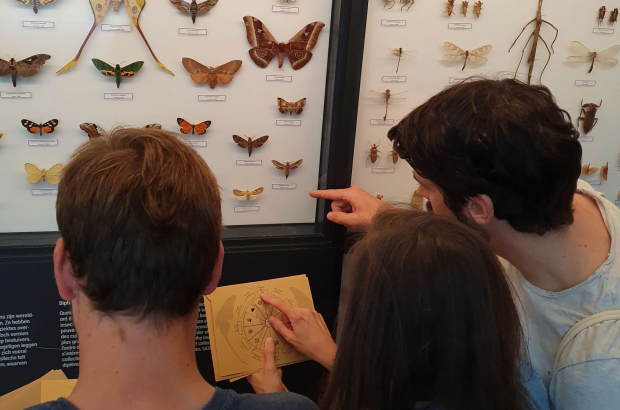- Daily & Weekly newsletters
- Buy & download The Bulletin
- Comment on our articles
Escape game opens Africa Museum up to new visitors
Take a large museum with a fascinating collection, located in an atmospheric period building. Add a small group of resourceful visitors. Mix in a mystery and a bag full of puzzles.
The result is AfricaMuseumQuest, Belgium’s first museum escape game. The game, which takes place at the Africa Museum in Tervuren, is the brainchild of HintSeekers, a young start-up from Ghent that uses games to change the way we experience cultural institutions, exhibitions and events.
The inspiration to set up the company came from a random visit to a major European art museum. “I wasn’t planning to visit a museum,” recalls co-founder Tuur Roels. “I just went there with friends to play a kind of escape game, but because of the game I discovered how awesome the museum was. It also made me think: Why don’t we have these kinds of games in Belgium?”
Roels’ background in marketing helped him spot the opportunity. For gaming expertise he hooked up with Kristof De Waele, a friend who had worked on mobile escape rooms and other team-building challenges.
Together they visited a number of Belgian museums, looking for a suitable host for their first venture. The Africa Museum soon stood out, in part because of the size and quality of its permanent exhibition.
“We can’t make a fun game out of a dull exhibition,” Roels says. “It needs to be exciting, and that is certainly the case at the Africa Museum.”
But the museum was also suitable because it needs to expand its audience. “A lot of people know about the Africa Museum, but when you ask around not so many have been there. So by creating this game, we can help persuade people to go and discover the museum.”

HintSeekers founders Kristof De Waele (l) and Tuur Roels
After a couple of visits for further research, HintSeekers approached the museum to see if it would be interested in the idea. The initial reaction was rather hesitant.
“They were not so keen on having a game played there,” Roels says. “We had to explain that the idea was not to have people running around, chasing each other and yelling.”
But Kristien Opstaele, who is in charge of external relations at the museum, was enthusiastic. With her support, they were able to develop the idea further, although this meant solving some puzzles of their own.
In a conventional escape room, the designers have complete control over the environment and can build in as many devious puzzles as they want. In the Africa Museum, nothing could be changed, so HintSeekers had to tailor their puzzles to what was already in the collection.
Another feature of a conventional escape game is that there is always someone watching, to give players a nudge in the right direction if they get stuck. In the museum, the game is not supervised, so it has to run smoothly whatever happens.
“The people working in the museum don’t know the solution and can’t help you with anything,” Roels explains. “Making the game autonomous was the most challenging part for us.”
Finally, the museum insisted that the game’s storyline should emphasise Africa’s potential rather than its past. So, it starts in the far future, in the Democratic Republic of Congo, where Mamdou and Arike are on their way to a concert. Then their electric car appears to run down.

“Within the introduction we talk about a very modern Kinshasa, so that people start with the idea that Africa is not just the savannah, lions and huts, but can be a technologically advanced place as well.”
In AfricaMuseumQuest, the pair have been trapped by an ancient demon, and the game’s players have to help free them by solving riddles and completing assignments. The game progresses from room to room, until a final riddle sets them free. Or not.
The game can be played in Dutch, English or French, and is pitched at groups of four to seven adults, although Roels thinks families should have no problem. “We say it is suitable for 16 years and up, but an adult could play it with smart teenagers.”
An average game lasts 90 minutes, and afterwards players are free to explore the museum at their own pace.
While HintSeekers started working on the game before the corona virus pandemic, it now seems tailor-made for the way we now live. “It’s perfect for your bubble, and lets you do something cultural, playful and fun.”
The one virus-related hitch came when the Africa Museum introduced a one-way system for visitors that sent them in the opposite direction to the game. “Now players are given a distinctive HintSeekers bag so that the guards know they are allowed to take a different route.”
While Roels sees great potential for developing games like this in other settings, the company’s immediate focus remains on the Africa Museum. “If all goes well, the next phase will be a game in the museum focused on kids, or with bigger groups. Then, if they work out, we will start looking at other museums – maybe in Belgium, maybe abroad.”
Photos courtesy HintSeekers


















